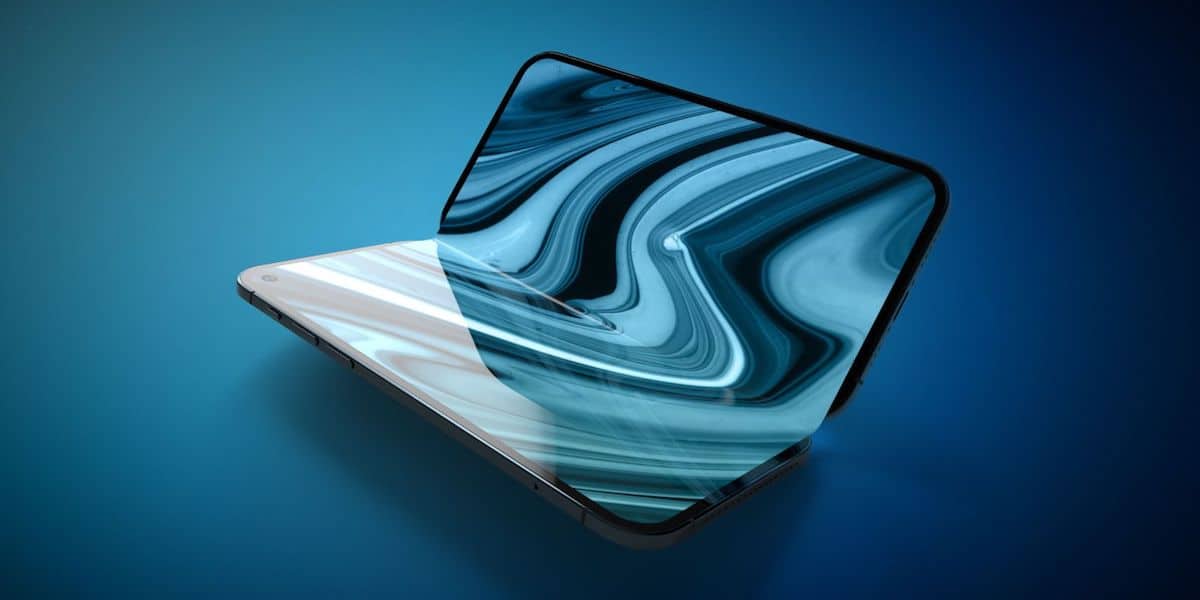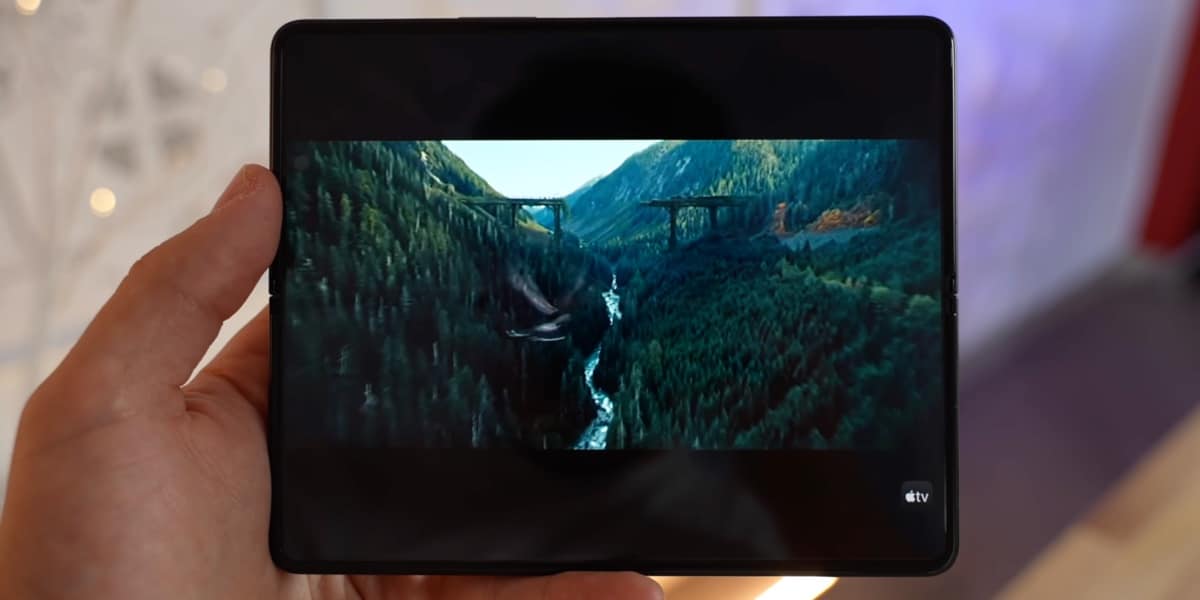
While other manufacturers continue to boast of their folding smartphone models, Apple remains out of the market for these types of devices, and according to rumors, we would still be a year or two away from seeing the first model, if we ever see it. Why hasn't Apple already launched this type of smartphone?
Foldable smartphones are the future, or at least that's what they want us to think about. Giants of the telephony market such as Samsung, Huawei, Motorola and Microsoft have already presented different models of phones with highly variable designs and more or less fortunate results. But while television advertisements teach us how "cool" a phone is that is folded in half to be able to record yourself on Instagram without the need for support, the reality is that These are devices that are hardly seen on the street (I have not seen any), with exorbitant prices even for a market that already has very high prices, and there are many doubts that this is nothing more than a passing fad that ends with millions of dollars invested in R&D thrown at the trash.
Apple, to see them coming
The benchmark technological giant in the market does not move. It continues with its flagship smartphone with a conventional design and betting on the same characteristics that have marked its success until now: excellent screen, outstanding camera, superb quality of materials and unrivaled power, all at a price that in most of the cases surpasses that of any other "TOP" model from the competition, but which is nevertheless sold like hotcakes. While, the rest of the brands are content to dominate the mid and low range of the market, without even being able to dream of approaching Apple in its reign in the high-end range. It is clear that at equal prices, the user prefers an iPhone, and that is why other brands have opted strongly for folding smartphones. If you want a piece of the high-end pie, it must be offering something that Apple doesn't offer.

Samsung already has several generations of folding phones, with two different concepts: Galaxy Fold and Z Flip. A smartphone that opens up to be a small tablet, and a smartphone that folds up to fit in your pocket. Motorola has opted for nostalgia with its Razr, a "shell" type phone with mid-range specifications but a high-end price for the simple fact of being foldable. Huawei, immersed in a free fall in the telephony market due to the sanction of the United States, does not forget the foldables with which for many it is the most beautiful of the "foldables" that have been presented so far, And we cannot forget Microsoft, that although their thing is not a folding phone itself (rather two screens joined by a hinge), it is also making its first steps in this market.
How many of these models have you been able to touch with our hands? Probably someone has been able to see them in person at a stand at a technology fair, or even in a phone store ... but how many of you have asked your friend for the flip phone to tinker with it? How many of you have bought one of these models? There will undoubtedly be some, but very few, too few for what should be the smartphone of the future, and we have already been on the market for 3 years with these devices.
Too many problems, too many doubts
The feeling with each and every one of these models is that they should have stayed as test products on the museum shelves of each of the manufacturers. We do not need to recall the enormous amount of problems that buyers of the first Samsung Galaxy Fold suffered.. Even those who were able to test the phone before it hit the market have already reported tremendous design flaws. It is not a simple technology, and the impression is that there is still a long way to go and many bugs to solve.

Launching a phone that is not ready is a serious problem that Apple cannot afford to suffer. No manufacturer should be allowed that luxury, but Apple even less so. And I'm not just talking about the image of the company, which claims that it offers top quality products to its buyers, but about the serious problem that would involve selling millions of units of a defective phone. How many Galaxy Folds were returned? I doubt that it would reach a million units. Apple in the first weekend would sell several million units, and this would be a problem of dimensions difficult to imagine.
An unclear concept that can go out of style
And the first thing that folding phone manufacturers should be clear about is what they want to offer the public, what they want to convince us that we want, although we are not yet clear about it ourselves. Do we want a phone that becomes a tablet? Or do we want a phone that folds up to slip into your pocket? I am not clear at all, and it is that the two concepts have their problems.
A phone that becomes a tablet is, a priori, the best of ideas, since you bring together in a single device the advantages of two different worlds: smartphone and tablet. When I want a phone, I leave it closed, and when I want a tablet, I open it. So far so great, but in return you have to carry a very thick and heavy device (like two smartphones together). Things don't look so good anymore. And when we open the phone and turn it into a tablet, what we have is an almost square screen, the worst of the worst to enjoy multimedia content because we waste much of it. In other words, I carry the equivalent of two cell phones in my pocket and when I want to watch a movie I see practically the same thing as if I carried my usual cell phone?

The other concept could therefore be more successful: a phone that we fold to put in our pocket. So I have a square device that when I want to use I have to unfold. It has a tiny screen when folded that lets me see the notifications I have received ... but little else. And therefore every time I want to do something I will have to open it, and close it again when I want to put it back in my pocket. It's starting to seem like a "not so good" idea to me. To that we add that when it is folded to store it in your pocket it will bulge much more, again we will have two smartphones together, no longer so long, more trimmed, but in thickness yes.
Which of the two concepts would I choose? With none, and that's where the main problem with folding smartphones lies: I really don't know if I want a folding phone. Because brands bombard me and tell me what I want, and the television commercials, the publications on YouTube and Instagram are very cool, but I am not sure that I will not get tired of that device in a few days. Are folding phones really the future? Or are they a fad more like 3D televisions or curved screens? Only time will tell.
And Apple is waiting
Apple is working on several models of foldable phones. It has several prototypes and is researching materials and technologies that can make them the next iPhone. But he is also aware that he cannot make the same mistakes as the competition, and that is why he is waiting. Because the more time passes, the more refined are the technologies necessary for these products to come to fruition, the more mistakes others will have made and the more Apple will have learned, and above all, clearer will have which concept of folding smartphone wants the user, if you want any.
The rumors They point to 2023 as the year in which Apple could launch its first foldable iPhoneSome say that it will not be until 2024 when we see it. And others say that we will not see any folding smartphone because this type of product will be forgotten sooner rather than later. We will continue to wait, and we will tell you promptly.